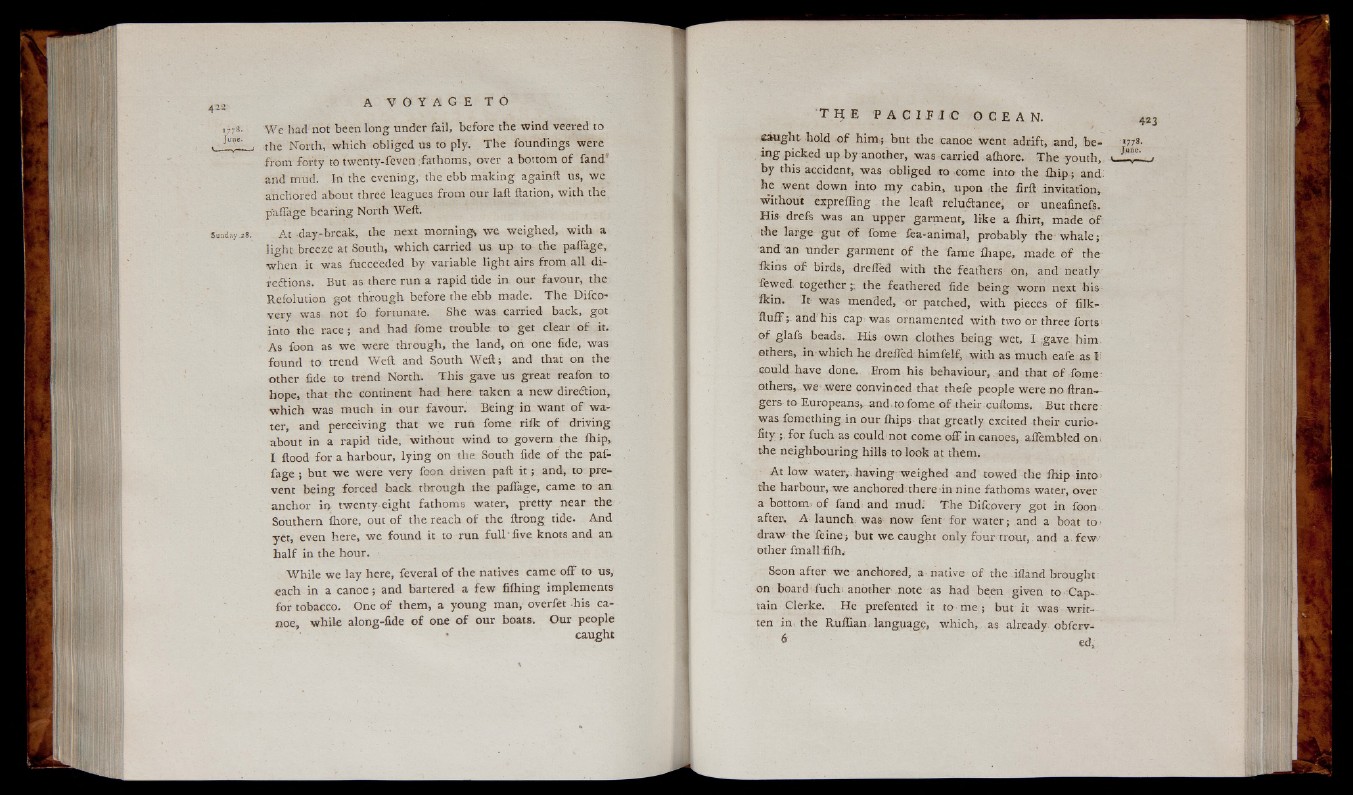
We had not been lo n g tinder fail, before the wind veered to
the North, w hich obliged us to ply. T he foundings were
from forty to twenty-feven .fathoms, over a bottom o f fand''
and mud. In the evening, the ebb makin g againft us, we
anchored about three leagues from our la il ftation, with thè
pafiage bearing North Weft.
At day-break, the next mornings w e weighed, w ith a
ligh t breeze at South, w hich carried us up to the paflage,
when it was fucceeded by- variable ligh t airs from all directions.
But as there run a rapid tide in our favour, the
Refolution got through before the ebb made. T h e Difco-
v e ry was not fo fortunate. She was carried back, got
into the race ; and had fome trouble to get clear o f it.
A s foon as we were through, the land, on one fide, was
found "to trend Weft and South Weft j and that on the
other fide to trend North. This gave us great reafon to
hope, that the continent had here taken a new dire&ion,
w hich was much in our favour. Being in want o f w a ter,
and perceiving that we run fome rifk o f driving
about in a rapid tide, without wind to govern the fhip,
I flood fo r a harbour, ly in g on the South fide o f the paf-
fage ; but w e were ve ry foon driven paft it ; and, to prevent
be in g forced back throu gh the paflage, came to an
anchor in twenty-eight fathoms water, pretty near the
Southern fhore, out o f the reach o f the ftrong tide. And
y et, even here, w e found it to run fu l l ’ five knots and an
h a lf in the hour.
W h ile we lay here, feveral o f the natives came o ff to us,
each in a canoe ; and bartered a few fifliing implements
for tobacco. One o f them, a yo u n g man, overfet his canoe,
w h ile along-fide o f one o f our boats. Our people
cau gh t
c a u g h t hold o f h im ; but the canoe went adrift, and, be in
g picked up by another, was carried aihore. T h e youth,
by this accident, was obliged to come into the fh ip ; and:
he went down into m y cabin, upon the firft invitation,
without exprefling the leaft reludtanee, or uneafinefs.
His drefc was an upper garment, lik e a fliirt, made o f
the large gu t o f fome fea-animal, probably the w h a le ;
and an under garment o f the fame fliape, made o f the
fkins o f birds, drefled with the feathers on* and nea tly
fewcd together z the feathered fide b e in g worn next his-
fkin. It was mended, -or patched, w ith pieces o f filk-
flufF;. and his cap was ornamented with two or three forts
o f glafs beads. His own clothes being wet, L;gave him
others, in which he drefled himfelf, with as much eafe as I
could have done. Erom his b eh a v iou r,. and that o f fome:
others,, w e-w ere convinced that thefe people were no ftran-
gers to Europeans, and. to fome o f their cuftoms. But there
was fomething in our fhips that grea tly excited their curio-
f i t y f o r fuch as could not come o ff in canoes, aflembled on.
the n eighbouring hills to look at them.
A l lo w water,, having: w eighed and towed the fhip into:
the harbour, w e anchored there in nine fathoms water, over
a bottom, o f fand and mud. T h e Difcovery got in foon-
after- A launch was- now fent for w a te r ; and a boat to-
draw the fein e; but w e caught only fo u r trout, and a few
other fmall fifhj
Soon a fte r w e anchored, a native o f the ifland brought
on board > fu ch ’. another note as had been given to - Captain
Clerke. He prefented it to me ; but it was written
in. the Ruffian, language, w hich, as already obferv-
6 ed,